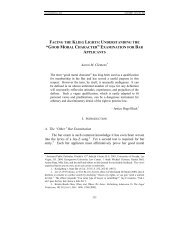Calendar 2005-2006 - The University of Akron
Calendar 2005-2006 - The University of Akron
Calendar 2005-2006 - The University of Akron
You also want an ePaper? Increase the reach of your titles
YUMPU automatically turns print PDFs into web optimized ePapers that Google loves.
68 <strong>The</strong> <strong>University</strong> <strong>of</strong> <strong>Akron</strong> <strong>2005</strong>-<strong>2006</strong><br />
Summit College<br />
Stanley B. Silverman, M.A., Dean<br />
Michael J. Jalbert, J.D., Interim Associate Dean<br />
Don Laconi, M.Ed., Assistant Dean<br />
OBJECTIVES<br />
Summit College helps to further the goals and purposes <strong>of</strong> the <strong>University</strong> by<br />
emphasizing the following objectives:<br />
• <strong>The</strong> college serves the student by providing the means to examine academic<br />
and career opportunities considering interests, abilities and achievements.<br />
• <strong>The</strong> college provides for industry, business, government agencies, health-care<br />
establishments and human service occupations; pre-service and in-service<br />
training for entry-level positions and/or advancement in employment.<br />
• Consistent with the philosophy <strong>of</strong> learning as a life-long experience, the college<br />
provides educational opportunities for the student no matter the age,<br />
background and need; full- or part-time, day or evening.<br />
• <strong>The</strong> college provides quality instruction with qualified and experienced teachers<br />
who are encouraged to use the community as a “laboratory” for achieving<br />
educational goals.<br />
<strong>The</strong> college also <strong>of</strong>fers bachelor’s degrees, certificates and minors.<br />
Cooperative Education<br />
Minimum requirements for cooperative education students include the following:<br />
• Enrollment in a program <strong>of</strong> study <strong>of</strong>fered by Summit College wherein cooperative<br />
education has been established.<br />
• Minimum grade-point average <strong>of</strong> 2.00 for all <strong>University</strong> <strong>of</strong> <strong>Akron</strong> course work<br />
and a minimum <strong>of</strong> 2.00 for all course work applicable to program <strong>of</strong> study.<br />
• Completion <strong>of</strong> specific courses and/or credits for a particular program as<br />
approved by the college faculty.<br />
Minor Areas <strong>of</strong> Study<br />
For an explanation <strong>of</strong> minor areas <strong>of</strong> study in Summit College, see Section 5 <strong>of</strong><br />
this Bulletin.<br />
DEVELOPMENTAL<br />
PROGRAMS<br />
<strong>The</strong> Department <strong>of</strong> Developmental Programs provides academic support:<br />
• for all <strong>University</strong> students through individual tutoring, work in the Study Skills<br />
centers, Mathematics and Writing laboratories, and study strategies courses.<br />
Through these activities students develop and strengthen the skills necessary<br />
for successful performance at the college level.<br />
• for students, including those who have been out <strong>of</strong> school for a number <strong>of</strong><br />
years, who wish to strengthen their educational preparation through course<br />
work in specific areas.<br />
Students must complete with a grade “C” or better any developmental courses<br />
they may be required to take within the first 32 credit hours attempted. Both<br />
credit hours and development hours are included in these first 32 hours.<br />
Developmental Courses<br />
Developmental courses are <strong>of</strong>fered in writing, reading, college reading and study<br />
skills, mathematics, and chemistry. (See 2010:042 through 071) Applied Study<br />
Strategies courses are <strong>of</strong>fered in conjunction with specific General Education<br />
courses such as Introduction to Psychology, Introduction to Sociology, U.S.<br />
History, Basic Math II, Government and Politics in the U.S., Natural<br />
Science:Biology, and others. (See 2010:064) Classes are small to provide maximum<br />
opportunity for individual help.<br />
BACCALAUREATE DEGREE<br />
PROGRAMS OF INSTRUCTION<br />
Computer Information Systems,<br />
Networking Option<br />
Baccalaureate level graduates have learned business computer and network<br />
applications and practices consistent with the requirements <strong>of</strong> the modern information<br />
technology pr<strong>of</strong>essional. This program emphasizes the knowledge and<br />
applied skills necessary to succeed in today’s environment.<br />
<strong>The</strong> networking option allows students to attain an in-depth study <strong>of</strong> network<br />
management including building, securing, managing, and troubleshooting multimedia<br />
wired and wireless LAN and WAN networks.<br />
Students entering the Computer Information Systems program must demonstrate<br />
a fundamental knowledge <strong>of</strong> computers by examination or take the following<br />
bridge courses prior to enrolling in the program.<br />
Required Bridge Courses: Credits<br />
2440:101 Fundamental Computer Concepts 1<br />
2440:102 Introduction to Windows 1<br />
2440:103 S<strong>of</strong>tware Fundamentals 2<br />
2540:140 Keyboarding for Non-majors 2<br />
2020:121 English 4<br />
2030:151 Elements <strong>of</strong> Mathematics I 2<br />
and<br />
2030:152 Elements <strong>of</strong> Mathematics II 2<br />
or<br />
2030:161 Math for Modern Technology 4<br />
2020:222 Technical Report Writing 3<br />
2040:240 Human Relations 3<br />
2040:247 Survey <strong>of</strong> Basic Economics 3<br />
2420:103 Essentials <strong>of</strong> Management Technology 3<br />
2420:104 Intro to Business in the Global Environment 3<br />
2420:211 Basic Accounting I 3<br />
2420:212 Basic Accounting II 3<br />
2420:202 Elements <strong>of</strong> Human Resource Management 3<br />
2820:161 Technical Physics: Mechanics I 2<br />
2820:163 Technical Physics: Electricity & Magnetism 2<br />
2440:140 Internet Tools 3<br />
2440:141 Web Site Administration 3<br />
2440:145 Operating Systems 3<br />
2440:201 Cisco Networking I 4<br />
or<br />
2600:240 Micros<strong>of</strong>t Networking I 3<br />
2440:202 Cisco Networking II 4<br />
or<br />
2600:242 Micros<strong>of</strong>t Networking II 3<br />
2440:203 Cisco Networking III 4<br />
or<br />
2600:244 Micros<strong>of</strong>t Networking III 3<br />
2440:204 Cisco Networking IV 4<br />
2440:240 Computer Information Systems Internship 3<br />
2440:247 Hardware Support 3<br />
2440:248 Advanced Hardware Support 3<br />
2440:268 Network Concepts 3<br />
2440:301 Advanced Routing 4<br />
2440:302 Remote Access 4<br />
2440:310 Wireless Networking 3<br />
2440:338 System Administration I 3<br />
2440:388 System Administration II 3<br />
2440:401 Multilayer Switching 4<br />
2440:402 Network Troubleshooting 4<br />
2440:410 Network Authentication and Security 3<br />
2440:420 Voice, Data, Video 3<br />
2440:430 Network Monitoring and Management 3<br />
2440:480 Current Topics in Computer Information Systems 3<br />
3300:112 English Composition II 3<br />
3400:210 Humanities in the Western Tradition I 4<br />
3600:120 Introduction to Ethics 3<br />
Area Studies (200 level see list 3) 2<br />
Natural Science Elective (list 1) 4<br />
Area Studies 300 level (see list 3) 2<br />
Physical Education Elective 1<br />
Humanities Elective (list 2) 3<br />
7600:105 Introduction to Public Speaking 3<br />
or<br />
7600:106 Effective Oral Communication 3

















